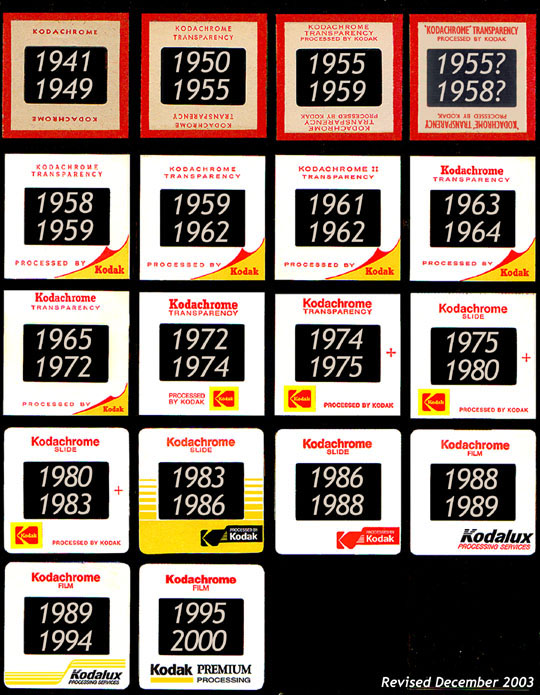Kodachrome
Slide Mount Chart
This chart
shows the
various styles of graphics printed on the back sides
of 35MM Kodachrome slides processed
by Kodak until about the
year
2000.
See Notes Below. Large dates appearing in center of
mounts
specify the
years during which these mounts
were used in production by Kodak.
This should help collectors date
slides if for some reason the
dates
printed on slides have faded or
have been otherwise obliterated.
The "red-border greymounts" were
usually not dated by Kodak.

Kodak, Kodachrome, Ektachrome and slide mount graphics
are trade marks of the Eastman Kodak Co.
Slide mounts used by Kodak to mount Ektachrome slides
processed by Kodak pretty much
parallel the dates and styles illustrated in the chart, with blue
replacing the red.
Kodachromes and Ektachromes processed by the many independent
processors over the years
were usually mounted in each processor's own mounts with different
graphics.
Notes:
Sometime
in the mid-1950's, Kodak added the words "Processed
by Kodak"
to their slide mounts as they were forced to allow more independent
labs
to process Kodachrome, yet wanted to identify Kodachrome processed
by Kodak for use as a marketing tool, and for trade dress protection.
Kodachrome II was a "new
improved film" (circa 1961) and warranted
special graphics on mounts used while this excellent film was
sold.
KII was soon superceded by
newer films which many professionals
didn't like as much because of increased contrast and other factors.
In the 1965 mount revisions, the famous "corner curl"
trade dress began
to shrink. Then, in 1972, Kodak introduced a newly designed square corp-
orate logo, which quickly made its way onto the mounts. The "curled
corner
trade dress was dropped, as it began
to seem a bit anachronistic on modern
products. Additionally, it was
felt that Kodak might not be able to protect a
general graphic such as the "corner curl" as exclusive trade
dress.
In 1983, the square corporate logo began to undergo many
variations
because of business agreements, and designs surfaced that more
or less
integrated the symbol within other graphic shapes.
Sometime around 1980, mounts began to appear with rounded corners.
Other processors were using rounded corners earlier. Rounded corners
were probably introduced to be easier to insert into projector
trays, etc.
Some mounts from about 1974 through 1983 displayed a red "+"
on the back side, right edge. In 1974, Kodak switched from Koda-
chrome II film (which was processed using "K-12"
chemistry) to
Kodachrome 25 and 64 films and a new processing
chemistry
called "K-14." From 1974 through 1983, Kodak continued
to run
both old and new chemistry processes in its labs because there
was still quite a bit of the older Kodachrome II film in
customers'
hands. It was thought important to be able to tell which film
was
which without having to demount the slide film, but at the same
time Kodak did not want to have to use two entirely different
mounts. Therefore, for the period of time when both processes
were being run in Kodak labs, the newer "K-14" process was dif-
ferentiated with the red "+" on the mount. Therefore,
mounts
issued by Kodak processing plants, mounts without the red "+"
and dated 1974 - 1983 identify the older KII film. In 1984, when
Kodak finally dropped the K-12 process entirely, the "+"
mark
also disappeared, and all Kodachrome slides processed by
Kodak
subsequently can be assumed to be the newer film.
Other sites of interest to slide
collectors:
"trainutz.com" and "RailSlide Collector On-Line" © 2009 by
Andy Romano.
Images at this site may not be copied without our written consent.
1109 ~8

